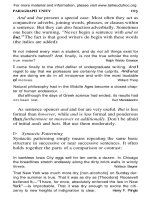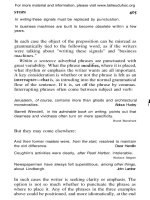Essential guide to writing part 14
Bạn đang xem bản rút gọn của tài liệu. Xem và tải ngay bản đầy đủ của tài liệu tại đây (278.73 KB, 15 trang )
(1) CONCISION
Adverbs and adjectives ought to link as directly as possible
with what they modify. The writers of the two examples
above are afraid of adverbs. (Many people are, perhaps made
timid by uncertainty about the ending.) "Unnatural" re-
ally describes "acted," but instead of directly connecting it to
that verb, the writer hangs it on the empty word "way" in an
unnecessary prepositional phrase. Similarly, the adverbial
phrase "in a brief statement" can be rendered with equal clar-
ity and far more economy by "briefly." The other three sen-
tences labor under ponderous adjectival phrases or clauses
when much briefer construction will do.
Use Participles
WORDY It leaves us with the thought that we were hasty.
CONCISE It leaves us thinking that we were hasty.
WORDY This is the idea that was suggested last week.
CONCISE This is the idea suggested last week.
Wordy modification often results from failing to use parti-
ciples. In cases like the first example an abstract noun
("thought"), which requires a preposition and an article, can
be replaced by one word, "thinking." The second example
here shows how to prune an adjectival clause consisting of a
relative word ("that") + a linking verb ("was") + a participle
("suggested") or other predicative term. By dropping the rel-
ative word and the linking verb, you can move directly from
the noun to the participle (or predicative word).
Sometimes an entire adverbial clause can be cut back to the
operative participle.
WORDY Because they were tired, the men returned to camp.
CONCISE Tired, the men returned to camp.
And sometimes an independent clause or sentence can be
trimmed:
For more material and information, please visit www.tailieuduhoc.org
THE SENTENCE
WORDY These ideas are already old-fashioned, and they are not
frequently met with.
CONCISE These ideas are already old-fashioned, infrequently
met with.
WORDY The women of the settlement would gather together at
one home to work on the quilt. They would bring their
children with them and spend the entire day, chatting
gaily as they worked.
CONCISE The women of the settlement would gather together at
one home to work on the quilt, bringing their children
and spending the entire day, chatting gaily as they
worked.
Use Predicate Adjectives
WORDY Riots became frequent affairs.
CONCISE Riots became frequent.
WORDY Mr. Martin is a quiet, patient, and cautious person.
CONCISE Mr. Martin is quiet, patient, and cautious.
WORDY The day was a perfect one.
CONCISE The day was perfect.
A predicate adjective stands after the noun it notionally mod-
ifies, connected to it by a linking verb (is, are, was, were,
seems, becomes, and so on), like "large" in this sentence:
The house is large.
An attributive adjective stands before the noun it modifies:
the large house
Predicate adjectives are not necessarily better. But it is bet-
ter not to restate a word or idea pointlessly as the above ex-
amples do. "Affairs," "person," and "one" are empty words,
hooks on which to hang an attributive adjective. Why not use
the adjective predicatively? Then the empty word is no longer
For more material and information, please visit www.tailieuduhoc.org
(1) CONCISION
needed. And even more important, the adjective will get the
emphasis it deserves.
Do Not State What Sentence Structure
Itself Makes Clear
Use Colon or Dash for Announcement
wordy There were many reasons for the Civil War, which in-
clude slavery, economic expansion, states' rights, cul-
tural differences, and sectional jealousies.
CONCISE There were many reasons for the Civil War: slavery,
economic expansion, states' rights, cultural differences,
and sectional jealousies.
WORDY Pitchers are divided into two classes. These classes are
starters and relievers.
CONCISE Pitchers are divided into two and
relievers.
In sentences like these, the colon or dash says: "Here comes
a series of particulars." If you let the punctuation mark talk,
you won't need deadwood like "which include" or "these
classes are." (The only difference between the colon and the
dash in this function is that the colon is a bit more formal.
However, each mark has other, very different tasks in which
they are not equivalents.)
The colon or dash can also set up an important idea delayed
for emphasis:
WORDY But a counterforce has been established within the
weapons platoon. This counterforce is the antitank
squad.
CONCISE But a counterforce has been established within the
weapons antitank squad.
Use Ellipses
WORDY He is taller than his brother is.
CONCISE He is taller than his brother.
For more material and information, please visit www.tailieuduhoc.org
THE SENTENCE
WORDY When you are late, you must sign yourself in.
CONCISE When late, you must sign yourself in.
WORDY He lost his wallet; she lost her pocketbook.
CONCISE He lost his wallet; she, her pocketbook.
An ellipsis (plural, ellipses) is the omission of words implied
by the grammar but not necessary to complete the sense. The
writer using an ellipsis assumes that readers can supply the
missing words from the context.
Ellipses often secure concision with no loss of clarity or
emphasis. They may even enhance those qualities. In the first
example above, the sense does not require the second "is";
moreover, the revision allows the sentence to end on the key
term "brother." In the second, the concise version stresses
"late" and avoids repeating "you"; while in the third, drop-
ping "lost" from the second clause makes a striking
statement.
The unusual quality of some ellipses, however, limits their
usefulness. For example, "He lost his wallet; she, her pock-
etbook" has a literary flavor that might seem odd in a matter-
of-fact, colloquial passage.
Use Parallelism
WORDY These books are not primarily for reading, but they are
used for reference.
CONCISE These books are not primarily for reading but for
reference.
WORDY The beginner must work more slowly, and he must
work more consciously.
CONCISE The beginner must work more slowly and more
consciously.
Parallelism means that two or more words, phrases, or
clauses are grammatically related in the same way to the same
thing. In "The man and the boy came in together," "man"
and "boy" are parallel because each acts as a subject of the
same verb ("came in"). Or in "She stood and raised her
For more material and information, please visit www.tailieuduhoc.org
(1) CONCISION
hand," "stood" and "raised" are parallel because each is a
verb of the same subject ("She").
Parallelism is like factoring in mathematics; instead of re-
peating in + 3ay + az, the mathematician writes a(2x
+ 3y + z). In a grammatically parallel construction the gov-
erning term need not be stated two or three times. In the first
example, the phrase "for reference," by being made parallel
to "for reading," does duty for the entire second clause.
But at times parallelism improves nothing. Emphasis or
rhythm often justifies a certain amount of repetition. Thus in
the second example above, the so-called "wordy" version
would be preferable if the writer wished to stress "he must
work."
For more material and information, please visit www.tailieuduhoc.org
CHAPTER
21
The Sentence:
(2) Emphasis
In speech we achieve emphasis in a variety of ways: by talking
loudly (or sometimes very softly); by speaking slowly, care-
fully separating words that ordinarily we run together; by
altering our tone of voice or changing its timbre. We also
stress what we say by nonvocal means: a rigid, uncompro-
mising posture; a clenched fist; a pointing finger; any of nu-
merous other body attitudes, gestures, facial expressions.
Writers can rely upon none of these signals. Yet they too
need to be emphatic. What they must do, in effect, is to trans-
late loudness, intonation, gesture, and so on, into writing.
Equivalents are available. Some are merely visual symbols for
things we do when talking: much punctuation, for example,
stands for pauses in speech. Other devices, while not un-
known in speech, belong primarily to composition. Some of
these we shall look at in this chapter.
First, though, we need to distinguish two degrees of em-
emphasis, which applies to the entire sentence,
partial emphasis, which applies only to a word, or a group
of words, within the sentence. As an example of total em-
phasis, consider these two statements:
An old man sat in the corner.
2. In the corner sat an old man.
For more material and information, please visit www.tailieuduhoc.org









